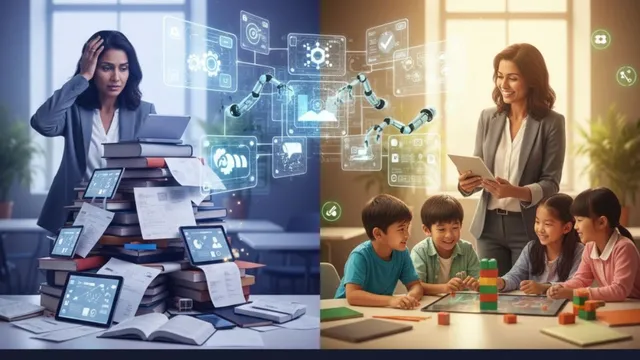- By Sarju Saran Tiwari
- Thu, 30 Oct 2025 03:48 PM (IST)
- Source:JND
Sustainable Educational Framework: In India, teachers currently spend a significant amount of their time on non-academic tasks, leading to high levels of teacher burnout and reduced focus on core teaching tasks. In other words, their time for teaching is diverted to non-academic administrative tasks, leaving them insufficient to teach students. Data shows that teachers can spend approximately 63% of their time on non-academic tasks, leaving fewer hours for teaching and mentoring.
The education sector is increasingly integrating artificial intelligence (AI) and enterprise resource planning (ERP) systems to automate these operational responsibilities, freeing teachers' time back in the classroom. This allows teachers to focus their time on teaching students without distractions. This is expected to have a direct impact on the quality of education.
The Scale of Administrative Work:
Educators are often tasked with excessive administrative work, including creating reports, data input, fee collection, and managing transportation logistics. This administrative burden often leads to stress and professional burnout.
Swoyan Satyandu, co-founder of the tech firm Neuron, commented on this situation, saying, "Teaching is still one of the most respected professions in society. However, today, teachers are not limited to academic work alone. They also feel burdened by non-academic tasks, which contributes to burnout."
Technology platforms are now focusing on automating these repetitive processes. By automating essential materials like lesson plans, timetables, and question papers, and providing NEP-aligned curriculum content, these systems aim to save teachers time that is currently spent on design and documentation.
AI's Role in Efficiency and Personalisation:
Beyond simple digitization, AI is being used to handle high-volume and low-cost manual tasks. For example, AI-supported evaluation systems can manage initial grading for exams, data compilation, and real-time performance analytics.
This automation frees up teachers' time for teaching. Satyendu said that eliminating repetitive tasks allows teachers to focus on personalized teaching, which can increase classroom engagement by up to 75 percent.
These AI tools provide data-driven insights that help teachers identify each student's skill gaps and strengths and tailor lessons to adaptive learning pathways. Operational tasks such as attendance, transportation management, procurement, and compliance reporting are being digitized and centralized so that teachers are not bogged down by error-prone administrative paperwork.
Satyendu said that technology should be seen as a partner in education. "School administrations should use automation and artificial intelligence to increase operational efficiency," he said, adding that this change is crucial to building a sustainable educational framework in India, allowing teachers to focus on the holistic development of students.

